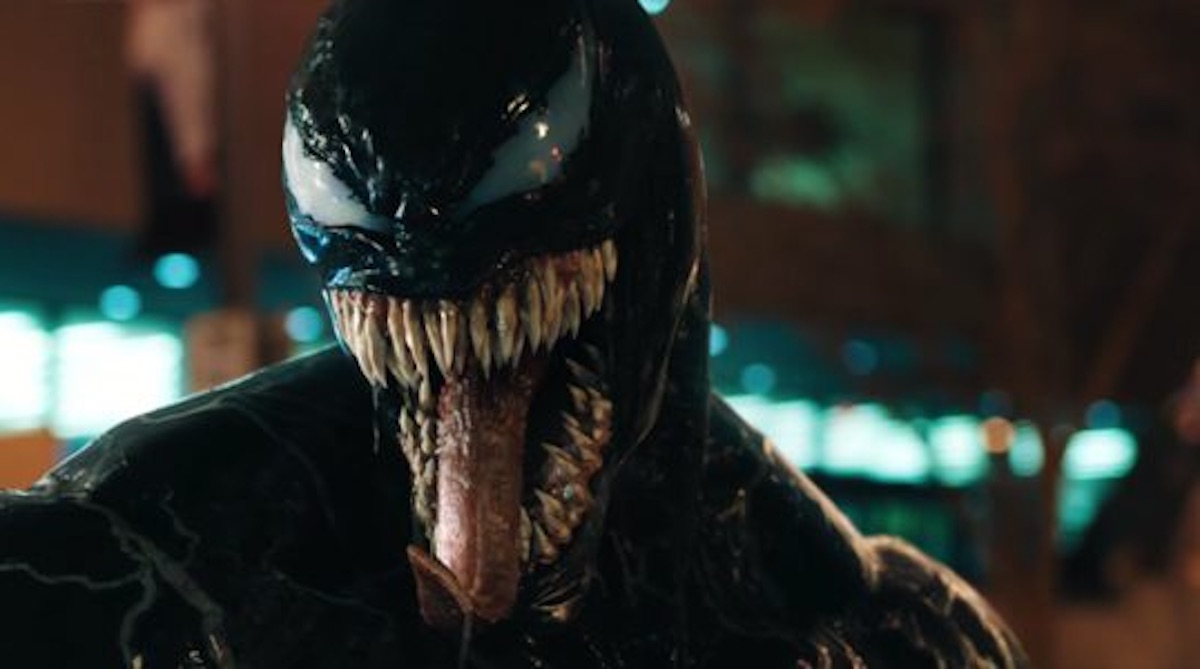Venom, Subtext, and the Race for On-Screen LGBT+ Representation


Listen, I know I keep talking about Venom and sex (much to the consternation of all my friends who get really horrified by my questions such as “in your OTP, who wants to bang Venom and who shames them for that”) but the most we think about the film and sexuality, the more intriguing it becomes.
Website io9 has a fascinating breakdown of Venom‘s overt and subtextual sexual imagery, but there is something that sticks out to me the more I consider the film, and that is the movie’s lack of hang-ups when it comes to sexuality and queerness.
It may seem like a small detail, but there is no moment in the film where the ostensibly heterosexual Eddie Brock gives us a wink and a sly “but no homo” as he and Venom interact. At one point, he says Venom is “up [his] ass,” and by the end of the film they’ve slipped into casual banter where Venom says that Eddie’s ex-girlfriend Anne belongs with them. Not with just Eddie, with the both of them. It’s hard not to read that as being incredibly loaded with subtext.
From the very few comics I’ve skimmed involving our symbiotic odd couple, the comics continue this tradition by having Eddie refer to Venom as “love” and having Eddie be the de facto father of Venom’s baby. He is literally told “You’re going to be a daddy” by another character, and he does not try to dispute that claim at all. Their relationship frequently dives into the borderline sexual without the safety net of a (probably male) writer making sure to drive home that his characters are all straight.
Superhero films have never been a particularly open genre for LGBT+ characters. While television allows for more representation, the films are all strictly heterosexual. Sure, Steve and Bucky might make googly eyes at each other and fight for each other, but we had better put in a scene of them reminiscing over a couple of girlfriends in Captain America: Civil War so that we don’t run the risk of anyone thinking they’re actually a couple. While the films have progressed to show open, affectionate friendships between male characters (women barely talk to each other though, so no luck on that front), there is still no canonical, onscreen LGBT+ rep.
And that’s just Marvel. The DCEU, which has a rather progressive television lineup, dodges any possible LGBT+ rep with Matrix-like skill. How hard would it have been to make Diana canonically bisexual in Wonder Woman—just like she is in the comics? Does DC not get that a Harley Quinn/Poison Ivy love story would do far better at the box office than a Joker/Harley film?
There is, of course, a famous leaked email from the Sony hack that also makes it abundantly clear that, in their licensing agreement with Marvel, Peter Parker can only be portrayed as a white, heterosexual man; suddenly, Andrew Garfield’s sudden dismissal from the franchise after he publicly talked about a bisexual Peter seems a lot weirder. The only major superhero film with a canon LGBT+ hero is Deadpool with Negasonic Teenage Warhead (and yes, I know Deadpool himself is pan, but we have yet to be told that in the actual text of the movie).
With that in mind, it’s sort of easy to see why Venom generated this much fandom excitement. It doesn’t talk down to LGBT+ fans, and while it certainly doesn’t go the full monty, it also doesn’t shy away from the inherent queerness of the Eddie/Venom relationship. They move as one, try to save each other, and in the end form a strong bond and respect that makes both of them less terrible. Also, it was Venom’s idea to kiss Eddie.
We are so desperate for a canonical LGBT+ romance onscreen in a superhero film that Venom has, somehow, become the queerest of all the films just by embracing the innate couple-y nature of the protagonists. This isn’t just a Marvel or a DC problem either—the only major franchise to embrace onscreen LGBT+ representation so far is Star Trek, and even that could’ve used a tiny bit more work. Everyone else treats sexuality like a bonus Easter Egg or as something that will happen eventually, but not right now.
Venom isn’t a good movie. And despite what you’ve read here, I’m not about to proclaim Venom/Eddie as an intentionally romantic couple, because I do not think the filmmakers’ intentions were to make that canon. But here we are, pointing at this film and going wild because this is the closest thing we have to a queer superhero film.
At this point, studios have to know that a canonically LGBT+ hero would draw more audiences. It’s just a matter of them being cowardly at this point, and audiences deserve better than this.
(image: Sony)
—The Mary Sue has a strict comment policy that forbids, but is not limited to, personal insults toward anyone, hate speech, and trolling.—
Have a tip we should know? [email protected]